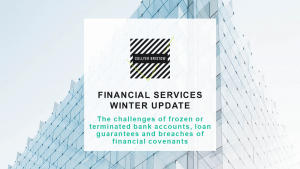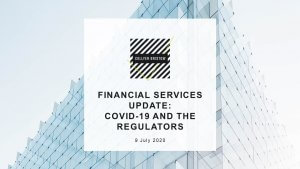- Banking & financial disputes
- Financial services

Shorter Reads
Coronavirus: How is the payments sector reacting to the fall-out from Covid-19?
We provide guidance on what businesses can do to maximise their cashflows.
3 minute read
Published 14 April 2020
Key information
Payments for goods and services which are made by credit or debit card are generally processed by one or more financial intermediaries prior to the funds being settled in a merchant’s bank account. These intermediaries, sometimes known as payment processors, perform various functions including authentication, authorisation, security and fraud checks and settlement.
One key intermediary (who may in fact perform a number of these functions) is the payment acquirer. Acquirers act on behalf of merchants and are the entities responsible for obtaining approval from a purchaser’s card issuer (i.e. bank or credit card company) before approving or rejecting a cardholder’s proposed payment to the merchant. As part of its role, an acquirer accepts the risk for the authorised transactions and will also be responsible for any disputes that arise – i.e. should the merchant fail to provide the purchased goods or services.
Importantly, funds paid out by card issuers pass through accounts held by (or on behalf of) acquirers before being paid to the end merchant. The acquirer is therefore often in a powerful controlling position in relation to the merchant.
Last year, we published an article entitled “Do Payment Processors Wield Too Much Power?”, which discussed whether the decline of Flybe was exacerbated by credit card processing providers withholding cash at a time when the airline needed it most. Since then, many struggling businesses have suffered a similar fate, including the now defunct travel company, Thomas Cook, and this scenario will doubtlessly sadly play-out for many more businesses struggling as a result of the COVID-19 pandemic.
Acquirers typically process payments within 1-3 days, but where a merchant operates in a moderate or high-risk sector, or has a poor credit rating, payments are often withheld for much longer periods in order to mitigate the acquirer’s own financial exposure. The reason for this practice is that an acquirer will usually be liable, in the first instance, to the purchaser where a merchant fails to provide the purchased goods or services after a credit or debit card payment is made. In these circumstances the cardholder (i.e. purchaser) will usually be able to obtain a refund from their own bank or card issuer, who will in turn require a refund from the acquirer.
This ’chargeback’ process leaves an acquirer out of pocket until it can recover the funds from the merchant – either directly, or from cash reserves that it has withheld from previous transactions. Even in benign markets, chargebacks can represent a significant risk to acquirers, particularly where payments are made by the purchaser well in advance of the receipt of the goods or services, such as a flight or hotel booking. In the current crisis, the risks are far greater.
As you would expect, acquirers have sophisticated risk management systems that allow them to reduce their financial exposure and which inform their credit control procedures; for example, what levels of funds they should be withholding from each merchant , and what credit facilities they may need to have in place to provide the acquirer with protection against exceptional events (such as the failure of a large business). Whilst acquirers have historically held a lot of power over struggling businesses, they too may now find themselves at significant financial risk due to the current economic climate precipitated by the COVID-19 pandemic.
Thousands of businesses have been forced to shut as a result of the Government imposed lockdown and sales in some sectors have fallen to zero as a result. Consequently, acquirers will have experienced a dramatic decline in fees from the merchants for their payment processing services. Moreover, as the unfortunate inevitability of countless insolvencies emerges, a greater concern for acquirers will be the sharp increase in chargebacks that are likely to occur.
Acquirers servicing the travel sector will be particularly hard hit. Given the catastrophic impact that COVID-19 restrictions have had on air travel and the hotel bookings alone, it is difficult to imagine that many acquirers will have sufficient protections in place to cover the likely numbers of chargebacks that will result from the thousands of bookings that can no longer be fulfilled (and the likely business failures that will follow). Similarly, acquirers contracted to process payments for merchants in the hospitality and food and drink sectors will also be heavily impacted. Those processing payments for e-commerce and grocery retailers will be less affected.
In the light of the current extraordinary market conditions, acquirers will be seeking to reduce risk wherever possible, which means that merchants are likely to see an increase in the frequency of acquirers making the decision to withhold cash from the merchants’ businesses for longer. Whether this is appropriate or effective is one question, but whether it is legally permissible under the terms of their agreement is another. Generally, agreements between acquirers and merchants are drafted heavily in favour of the intermediary. However, merchants should check the relevant contract terms carefully to ensure that acquirers are abiding by their obligations and releasing funds in accordance with the contract.
Even in circumstances where acquirers are entitled to withhold cash, merchants would be well advised to try to negotiate early release of funds, as they may find that acquirers are more receptive to these talks in the current climate – acquirers will certainly wish to prevent otherwise healthy businesses falling into insolvency wherever possible.
Our Banking & financial disputes team is well placed to advise on these matters and would be very pleased speak to those requiring assistance in this sector.
Related content
Shorter Reads
Coronavirus: How is the payments sector reacting to the fall-out from Covid-19?
We provide guidance on what businesses can do to maximise their cashflows.
Published 14 April 2020
Associated sectors / services
Authors
Payments for goods and services which are made by credit or debit card are generally processed by one or more financial intermediaries prior to the funds being settled in a merchant’s bank account. These intermediaries, sometimes known as payment processors, perform various functions including authentication, authorisation, security and fraud checks and settlement.
One key intermediary (who may in fact perform a number of these functions) is the payment acquirer. Acquirers act on behalf of merchants and are the entities responsible for obtaining approval from a purchaser’s card issuer (i.e. bank or credit card company) before approving or rejecting a cardholder’s proposed payment to the merchant. As part of its role, an acquirer accepts the risk for the authorised transactions and will also be responsible for any disputes that arise – i.e. should the merchant fail to provide the purchased goods or services.
Importantly, funds paid out by card issuers pass through accounts held by (or on behalf of) acquirers before being paid to the end merchant. The acquirer is therefore often in a powerful controlling position in relation to the merchant.
Last year, we published an article entitled “Do Payment Processors Wield Too Much Power?”, which discussed whether the decline of Flybe was exacerbated by credit card processing providers withholding cash at a time when the airline needed it most. Since then, many struggling businesses have suffered a similar fate, including the now defunct travel company, Thomas Cook, and this scenario will doubtlessly sadly play-out for many more businesses struggling as a result of the COVID-19 pandemic.
Acquirers typically process payments within 1-3 days, but where a merchant operates in a moderate or high-risk sector, or has a poor credit rating, payments are often withheld for much longer periods in order to mitigate the acquirer’s own financial exposure. The reason for this practice is that an acquirer will usually be liable, in the first instance, to the purchaser where a merchant fails to provide the purchased goods or services after a credit or debit card payment is made. In these circumstances the cardholder (i.e. purchaser) will usually be able to obtain a refund from their own bank or card issuer, who will in turn require a refund from the acquirer.
This ’chargeback’ process leaves an acquirer out of pocket until it can recover the funds from the merchant – either directly, or from cash reserves that it has withheld from previous transactions. Even in benign markets, chargebacks can represent a significant risk to acquirers, particularly where payments are made by the purchaser well in advance of the receipt of the goods or services, such as a flight or hotel booking. In the current crisis, the risks are far greater.
As you would expect, acquirers have sophisticated risk management systems that allow them to reduce their financial exposure and which inform their credit control procedures; for example, what levels of funds they should be withholding from each merchant , and what credit facilities they may need to have in place to provide the acquirer with protection against exceptional events (such as the failure of a large business). Whilst acquirers have historically held a lot of power over struggling businesses, they too may now find themselves at significant financial risk due to the current economic climate precipitated by the COVID-19 pandemic.
Thousands of businesses have been forced to shut as a result of the Government imposed lockdown and sales in some sectors have fallen to zero as a result. Consequently, acquirers will have experienced a dramatic decline in fees from the merchants for their payment processing services. Moreover, as the unfortunate inevitability of countless insolvencies emerges, a greater concern for acquirers will be the sharp increase in chargebacks that are likely to occur.
Acquirers servicing the travel sector will be particularly hard hit. Given the catastrophic impact that COVID-19 restrictions have had on air travel and the hotel bookings alone, it is difficult to imagine that many acquirers will have sufficient protections in place to cover the likely numbers of chargebacks that will result from the thousands of bookings that can no longer be fulfilled (and the likely business failures that will follow). Similarly, acquirers contracted to process payments for merchants in the hospitality and food and drink sectors will also be heavily impacted. Those processing payments for e-commerce and grocery retailers will be less affected.
In the light of the current extraordinary market conditions, acquirers will be seeking to reduce risk wherever possible, which means that merchants are likely to see an increase in the frequency of acquirers making the decision to withhold cash from the merchants’ businesses for longer. Whether this is appropriate or effective is one question, but whether it is legally permissible under the terms of their agreement is another. Generally, agreements between acquirers and merchants are drafted heavily in favour of the intermediary. However, merchants should check the relevant contract terms carefully to ensure that acquirers are abiding by their obligations and releasing funds in accordance with the contract.
Even in circumstances where acquirers are entitled to withhold cash, merchants would be well advised to try to negotiate early release of funds, as they may find that acquirers are more receptive to these talks in the current climate – acquirers will certainly wish to prevent otherwise healthy businesses falling into insolvency wherever possible.
Our Banking & financial disputes team is well placed to advise on these matters and would be very pleased speak to those requiring assistance in this sector.
Associated sectors / services
- Banking & financial disputes
- Financial services
Authors
Need some more information? Make an enquiry below.
Subscribe
Please add your details and your areas of interest below
Article contributor
Isobel
McNaughtAssociate
Specialising in Commercial disputes and Banking & financial disputes
Enjoy reading our articles? why not subscribe to notifications so you’ll never miss one?
Subscribe to our articlesMessage us on WhatsApp (calling not available)
Please note that Collyer Bristow provides this service during office hours for general information and enquiries only and that no legal or other professional advice will be provided over the WhatsApp platform. Please also note that if you choose to use this platform your personal data is likely to be processed outside the UK and EEA, including in the US. Appropriate legal or other professional opinion should be taken before taking or omitting to take any action in respect of any specific problem. Collyer Bristow LLP accepts no liability for any loss or damage which may arise from reliance on information provided. All information will be deleted immediately upon completion of a conversation.
Close









































































